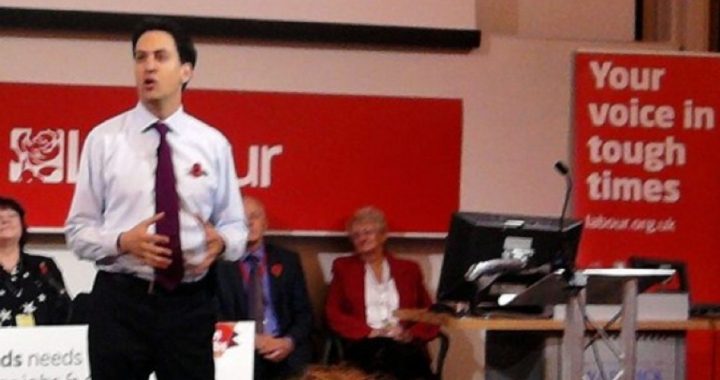
Perhaps he just wants to show he’s doubleplusgood, but the man who may be Britain’s next prime minister has pledged to stop at nothing to stamp out “Islamophobia.” Labour Party leader Ed Miliband (shown) — who now enjoys a slight lead in election polls — made the promise during an interview in which he also said he’d support the creation of a Palestinian state. As for his Islamophobia remarks, the Muslim News reports:
“We are going to make it an aggravated crime. We are going to make sure it is marked on people’s records with the police to make sure they root out Islamophobia as a hate crime,” Miliband told the Editor of The Muslim News, Ahmed J Versi in a wide ranging exclusive interview.
“We are going to change the law on this so we make it absolutely clear of our abhorrence of hate crime and Islamophobia. It will be the first time that the police will record Islamophobic attacks right across the country,” he said.
Miliband’s comments were an obvious attempt to rally the Muslim vote, which favors Labour, Britain’s leftist party; in fact, at two different points in the interview Miliband emphasized that “people” should vote in the U.K. general election, taking place May 7.
Nonetheless, given that Britain already has hate-speech laws — used mainly against indigenous Britons (especially Christians) and not minorities — Miliband’s pledge should give voters pause. In fact, many would find the candidate’s comments chillingly Orwellian, as a promise to stamp out Islamophobia, taken at face value, constitutes a targeting of thought. After all, a phobia literally defined is a fear, and the operative (and silly) definition of Islamophobia also involves thought: hatred — of Muslims.
And you express politically incorrect thoughts in Britain — and anywhere else in the Western world where hate-speech laws exist, which is almost everywhere — at your own peril. In 2006, 14-year-old working-class schoolgirl Codie Stott was arrested simply for asking to be seated with students whom she could understand, as opposed to the group of Pakistanis she was grouped with, who were speaking a foreign language. Last year, 75-year-old retiree Paul Griffith was arrested at Britain’s Stansted airport for joking with security, “I’m not Muslim, am I?” Also in 2014, leader of the Liberty GB Party Paul Weston read publicly a Winston Churchill quotation critical of Islam — and was taken into custody and charged with a “Racially Aggravated Crime.” And talk-show host Michael Savage is still banned from entering the U.K., along with terrorists and hard-core criminals, merely because he has expressed politically incorrect views on air.
Yet given the incessant redefining of the innocuous and innocent as insidious, who knows what zeal for eliminating “hate” could lead to? Just consider, for instance, the academic paper “Subtle and Overt Forms of Islamophobia: Microaggressions toward Muslim Americans” in something called the Journal of Muslim Mental Health. Lead author, psychology professor Kevin L. Nadal, and his collaborators provide a list of anti-Muslim “microaggressions.” It follows, interspersed with commentary:
1. “Endorsing Religious Stereotypes: Statements or behaviors that communicate false, presumptuous, or incorrect perceptions of certain religious groups (e.g., stereotyping that a Muslim person is a terrorist or that a Jewish person is cheap).”
Who will decide what perceptions are false?
2. “Exoticization: Instances where people view other religions as trendy or foreign (e.g., an individual who dresses in a certain religion’s garb or garments for fashion or pleasure).”
The allure of the exotic is now to be considered prejudice? This would brand most Western converts to Buddhism as bigots, and innumerable people are drawn to exotic restaurants and opposite-sex individuals. Moreover, Barack Obama was possibly trading on an exotic cachet when claiming in his Acton & Dystel bio that he was born in Kenya (the only other explanation is that he actually was born in Kenya).
3. “Pathology of Different Religious Groups: Statements and behaviors in which individuals equate certain religious practices or traditions as being abnormal, sinful, or deviant (e.g., telling someone that they are in the ‘wrong’ religion).”
This redefines piety as prejudice. After all, why embrace a religion and sacrifice for it unless you believe it reflects Truth, that it is the right faith? And correlative to this is that other religions are wrong, at least in part. Moreover, if we can tell people their ideology is fallacious, why not their religion?
Also note that tacit in the authors’ definition is that absolutism is wrong and relativism is right.
4. “Assumption of One’s Own Religious Identity as the Norm: Comments or behaviors that convey people’s presumption that their religion is the standard and behaves accordingly (e.g., greeting someone ‘Merry Christmas’ or saying ‘God bless you’ after someone sneezes conveys one’s perception that everyone is Christian or believes in God).”
Does someone’s taking offense at your saying “Merry Christmas” or “God bless you” convey the perception that there’s something wrong with your religion? And does wishing someone a “good day” convey the perception that everyone believes in good days? An eternal pessimist might take issue.
5. “Assumption of Religious Homogeneity: Statements in which individuals assume that every believer of a religion practices the same customs or has the same beliefs as the entire group (e.g., assuming that all Muslim people wear head coverings).”
Since religion is defined by belief, we could assume that all orthodox adherents are likeminded. I suppose, though, that the professors want us to consider the existence of heretics.
6. “Denial of Religious Prejudice: Incidents in which individuals claim that they are not religiously biased, even if their words or behaviors may indicate otherwise.”
Get ready to have “Christian privilege” added to “white privilege.” And re-education-camp style, don’t bother denying your bias; this will just confirm that you’re beyond redemption.
And as mentioned earlier, when politically correct hairs are split to find a reason to split politically incorrect heads, don’t expect equal application of law. As pundit Mark Steyn wrote last year, citing an earlier column that began “with a reader’s recollection of the first weeks of the Salman Rushdie fatwa”:
A couple of years back, I mentioned the fatwa against Salman Rushdie and received a flurry of lively e-mails. It was Valentine’s Day 1989, you’ll recall, when the Ayatollah Khomeini issued his extraterritorial summary judgment on a British subject, and shortly thereafter large numbers of British Muslims were marching through English cities openly calling for Rushdie to be killed.
A reader in Bradford recalled asking a West Yorkshire officer on the street that day why the various “Muslim community leaders” weren’t being arrested for incitement to murder. The officer said they’d been told to “play it cool”. The calls for blood got more raucous. My correspondent asked his question again. The policeman told him to “F— off, or I’ll arrest you.”
So hate-speech laws are aptly named. Your words are actionable if the government hates your speech.



